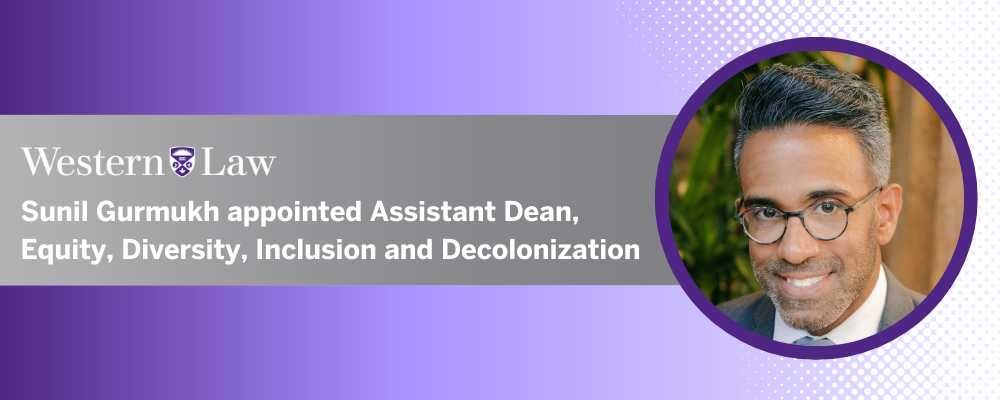Sunil Gurmukh appointed Assistant Dean, Equity, Diversity, Inclusion and Decolonization
November 06, 2023

Sunil Gurmukh has been appointed as assistant professor and the assistant dean of equity, diversity, inclusion and decolonization (EDID) at Western Law. He is teaching courses on racial profiling in policing and hate speech. He is also leading the Hidden Racial Profiling Project and conducting research into hate crimes. He previously served as a visiting lecturer and adjunct professor at Western Law.
Gurmukh has over 13 years of experience as a human rights lawyer. He has worked on significant human rights cases at the Human Rights Tribunal of Ontario and all levels of court, including the Supreme Court of Canada. In addition to litigation, his human rights work has included: policy development, partnerships, advisory work, engagement of equity-deserving groups, presentations, publications, teaching and research across many prohibited grounds of discrimination.
He has received numerous awards for his human rights work, including Western University’s Young Alumni Award (2021) and Precedent Magazine’s Precedent Setter Award (2016). In 2019, he was named as one of country's top 25 most influential lawyers by Canadian Lawyer Magazine.
He is currently on leave from his role of counsel at the Ontario Human Rights Commission (OHRC). Prior to joining the OHRC in 2011, he worked at the African Canadian Legal Clinic as a staff lawyer.
We recently spoke with Assistant Dean Gurmukh to discuss his priorities for the role, hopes for the faculty and how students can get involved in EDID initiatives.
What drew you to the role of assistant dean, equity, diversity, inclusion and decolonization (EDID)?
Western Law is close to my heart. As a graduate, former adjunct professor, former visiting lecturer and human rights lawyer, driving EDID organizational change at Western Law is more than an interest of mine; it is a passion.
It is a passion that has been fueled by our students, leadership, faculty and staff. I’m grateful for their insight, engagement and commitment to EDID, which I’ve been fortunate to witness every week. They have created the perfect storm for change.
What do you see as some of your priorities as you begin the role?
I hope to bring students together to identify a shared sense of empathy and encourage respectful dialogue amid the Israel-Hamas war.
Charting a path forward to implement the recommendations of the final report of Western Law’s Anti-Racism Working Group is also a priority. So is the development of a broader EDID strategic plan at Western Law, which includes addressing accessibility.
A strong Western Law Committee on EDID and meaningful engagement with students, faculty and staff will be keys to our success.
What is your greatest hope for the role and future of Western Law?
My greatest hope for the role and future of Western Law is a culture where everyone feels a sense of belonging - the impact of which extends far beyond Western Law. Embedding EDID as a core value in lawyering begins with the practice of embedding EDID in law school.
What advice do you have for our students about how they can foster inclusivity and equity in the law school environment and as they enter their careers?
Put yourself in other people’s shoes, whether it be fellow students or clients. Actively reflect on and seek to learn about the lived experiences of members of equity-deserving groups. Amplify their voices.
How can students get involved with EDID initiatives at Western Law?
There are many ways that students can get involved with EDID initiatives at Western Law, including:
- Join the Student Legal Society Diversity Committee
- Join clubs, like Students for Truth and Reconciliation, the Gender and the Law Association, Western Women in Law, OUTLaws, the Muslim Law Students Association, the Jewish Law Students Association or the Black Law Students Association
- Take courses about EDID issues, like Canadian Human Rights Law (or my courses)
- Attend the Indigenous Law Camp
- Complete training and certificate programs offered by Western University’s Office of Equity, Diversity and Inclusion
- Apply to be a research assistant with the Western Law EDID office or with a professor working on EDID-related issues
Change often starts with a conversation. We all have a role to play in building ongoing and open dialogue about EDID at Western Law and in the law and legal profession more broadly. I welcome the opportunity to chat with students, faculty and staff about EDID. My physical and virtual doors are always open (sgurmukh@uwo.ca). I look forward to the change that we will create together.
Disclaimer: The above are the views of Sunil Gurmukh. They do not represent the views of the Ontario Human Rights Commission or Ontario Public Service.






